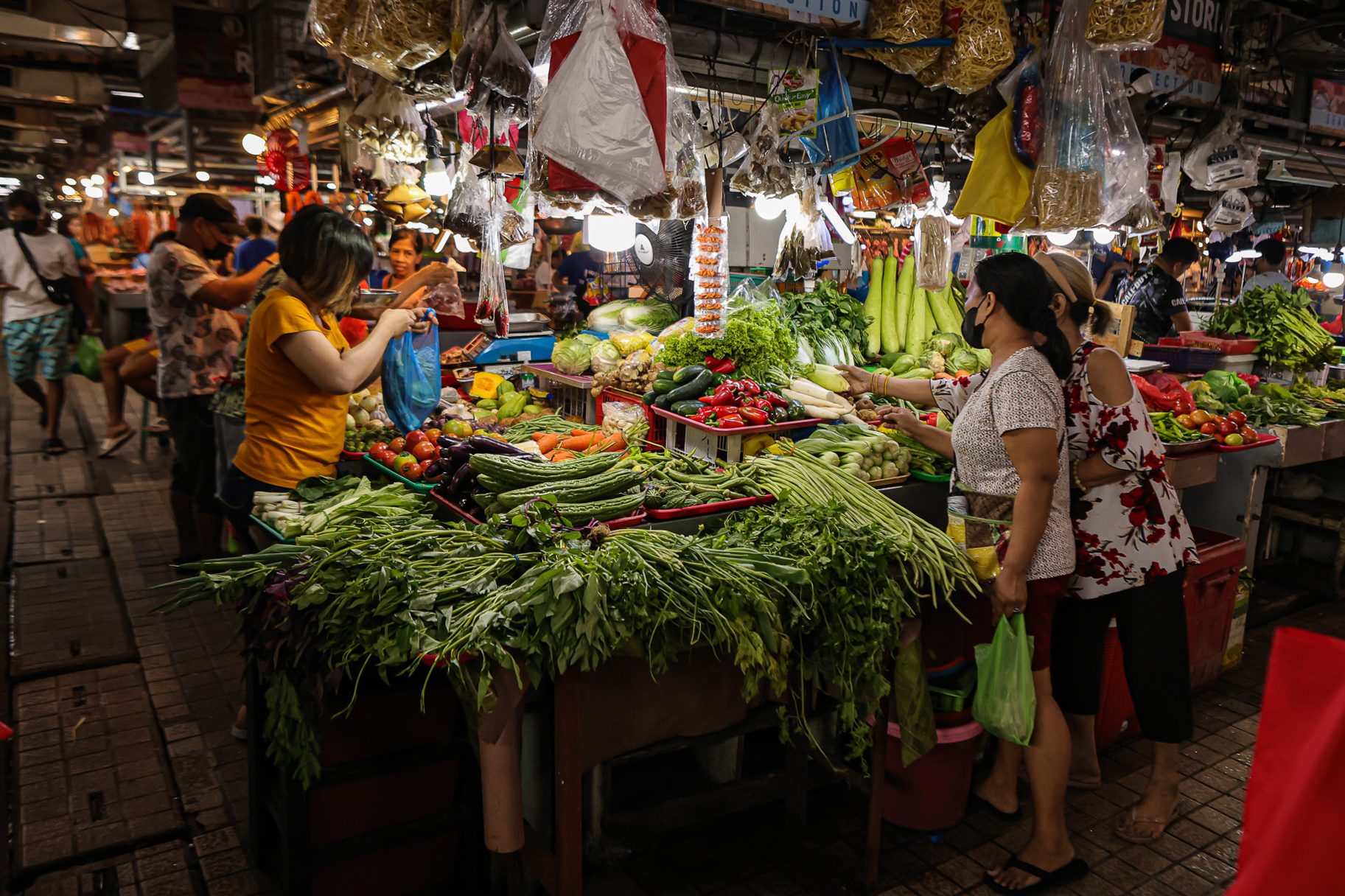SUMMARY
This is AI generated summarization, which may have errors. For context, always refer to the full article.

MANILA, Philippines – Prices of goods accelerated at a slower pace in March, but there may still be a long way to go before inflation settles within the government’s desired level.
Inflation in March fell to 7.6%, the Philippine Statistics Authority (PSA) announced on Wednesday, April 5. The latest figure is lower than the 8.6% recorded in February 2023, but higher than the 4% print in March 2022.
Year-to-date, average inflation stands at 8.3%.
The March downtrend was primarily due to the deceleration of inflation in food and non-alcoholic beverages (9.3% from 10.8%); transport (5.3% from 9%); and housing, water, electricity, gas, and other fuels (7.6% from 8.6%).
For food alone, inflation eased to 9.5% in March, compared to 11.1% in February. Price increases of vegetables (20% from 33.1%), meat (4.6% from 6.5%), and sugar (35.2% from 37%) moved at a slower pace.
For transport, gasoline (-7.4% from 3.8%) and diesel (-6% from 14%) drove the slowdown.
The PSA also reported slower inflation in liquefied petroleum gas (-1% from 9.1%) and electricity (17.3% from 19.5%).
Main sources of inflation deceleration in March: Food and non-alcoholic beverages; transport; housing, water, electricity, gas and other fuels. @rapplerdotcom pic.twitter.com/Sq8oLUAI9U
— Ralf Rivas (@RalfRivas) April 5, 2023
However, core inflation, which excludes volatile items like some food items and petroleum, increased to 8% from 7.8%, indicating that price increases continue to be broad-based.
Inflation in Metro Manila went down to 7.8% from 8.7%. All regions except for the Bangsamoro Autonomous Region in Muslim Mindanao posted lower figures.
Inflation in the National Capital Region eases to 7.8%. Almost all regions post lower figures in March, except for BARMM. pic.twitter.com/ASNnXZ021A
— Ralf Rivas (@RalfRivas) April 5, 2023
Sticky inflation
In a statement, the Bangko Sentral ng Pilipinas (BSP) said the effect of supply shortages on domestic food prices remains a concern.
The BSP also noted that higher transport fares, increasing electricity rates, and the “above-average” wage adjustments in 2023 point to the broader-based nature of price pressures.
“On the downside, the impact of a weaker-than-expected global economic recovery continues to be the primary factor that could dampen inflation,” added the central bank.
The Philippines’ economic team is aiming for inflation to go down to 2% to 4%.
Estimates, however, point to inflation remaining sticky. For instance, the Asian Development Bank (ADB) projected inflation in the Philippines would average 6.2% in 2023 before easing to 4% in 2024.
“Local food supply constraints and rising global commodity prices led to high inflation rates in early 2023. Inflation is projected to decelerate in the second half of 2023 and through 2024 as the series of monetary policy tightening take effect and global commodity prices ease,” the ADB said in a report on Tuesday, April 4.
President Ferdinand Marcos Jr. has assembled a Cabinet-level inter-agency panel to monitor inflation. The panel’s tool kit includes the use of satellites and data science to monitor crop yield and anticipate potential pest or disease problems. Data from the satellites would then help the government and the private sector to time imports better.
“We need a robust monitoring system and forecasting tools supported by reliable and timely information that will assist us in offering appropriate recommendations to the President and the Cabinet. These will help us in developing suitable policies and interventions to achieve food and energy security, while ensuring that our country stays on course to sustained economic transformation and inclusive growth,” said National Economic and Development Authority Secretary Arsenio Balisacan. – Rappler.com
Add a comment
How does this make you feel?
![[EDITORIAL] Apat na taon na lang Ginoong Marcos, ‘di na puwede ang papetiks-petiks](https://www.rappler.com/tachyon/2024/07/animated-bongbong-marcos-2024-sona-day-carousel.jpg?resize=257%2C257&crop=280px%2C0px%2C720px%2C720px)
![[In This Economy] Delulunomics: Kailan magiging upper-middle income country ang Pilipinas?](https://www.rappler.com/tachyon/2024/07/in-this-economy-upper-middle-income-country.jpg?resize=257%2C257&crop=421px%2C0px%2C1080px%2C1080px)

![[EDITORIAL] Marcos Year 2: Hilong-talilong](https://www.rappler.com/tachyon/2024/07/animated-bongbong-marcos-2nd-sona-carousel.jpg?resize=257%2C257&crop=136px%2C0px%2C720px%2C720px)
![[Newspoint] A fighting presence](https://www.rappler.com/tachyon/2024/07/thought-leaders-a-fighting-presence.jpg?resize=257%2C257&crop=441px%2C0px%2C1080px%2C1080px)
There are no comments yet. Add your comment to start the conversation.